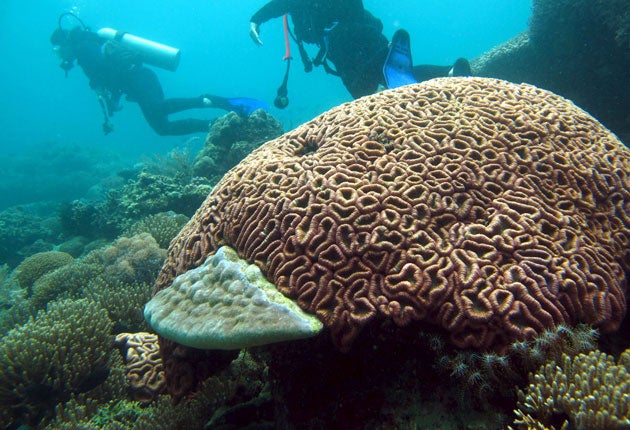Cut emissions or acidity will kill coral reefs, scientists say
'Underwater catastrophe' is imminent without action

Rising acidity in oceans is leading to a global catastrophe that would be unparalleled in tens of millions of years, according to the national science academies of 69 countries which want governments to take the issue more seriously in the run-up to the December climate change conference in Copenhagen.
The rate at which the oceans are turning acidic because of rising carbon dioxide concentrations in the atmosphere is faster than at any other time since the extinction of the dinosaurs 65 million years ago, the scientists said in a joint statement issued today in advance of this week's pre-Copenhagen conference on climate change in Bonn.
As carbon dioxide increases in the air above the ocean, more of the gas gets dissolved in the surface water of the sea, creating carbonic acid. Since the start of the industrial revolution, the acidic activity of the oceans has increased by 30 per cent. At current rates, they will become so acidic that few shell-forming organisms and coral reefs will be able to survive by mid-century.
The academies, which include those in China and the US, have called on governments to treat ocean acidification as an important problem caused by the rising levels of man-made carbon dioxide, urging them to agree on significant cuts in carbon dioxide emissions – at least to half of 1990 levels by 2050. Lord Rees of Ludlow, the president of the Royal Society – Britain's national academy of sciences – said: "Unless global CO2 emissions can be cut by at least 50 per cent by 2050 and more thereafter, we could confront an underwater catastrophe, with irreversible changes in the makeup of our marine biodiversity," Lord Rees said.
It is estimated that the oceans have absorbed about a quarter of man-made carbon dioxide emissions since the industrial revolution but one of the outcomes of this absorption has been a fall in the natural alkalinity of the sea and a corresponding increase in its acidity.
As carbon dioxide dissolves in water, it produces acidic hydrogen ions which attack the carbonate ions that are the building blocks of the calcium shells and skeletons used by corals and shellfish. Carbonate ion concentrations are lower now than at any other time in the past 800,000 years, the panel said.
"Global atmospheric CO2 concentrations are now at 387 parts per million ... model projections suggest that by mid-century, CO2 concentrations will be more than double pre-industrial levels and the oceans will be more acidic than they have been for tens of millions of years," the panel said.
"These changes in ocean chemistry are irreversible for many thousands of years, and the biological consequences could last much longer."
Even if levels of carbon dioxide were stabilised at the target of 450 parts per million, more than 90 per cent of tropical coral reefs will be affected by uncomfortably high levels of acidity. Stabilisation at 550 parts per million could result in reefs dissolving.
Join our commenting forum
Join thought-provoking conversations, follow other Independent readers and see their replies
Comments
Bookmark popover
Removed from bookmarks